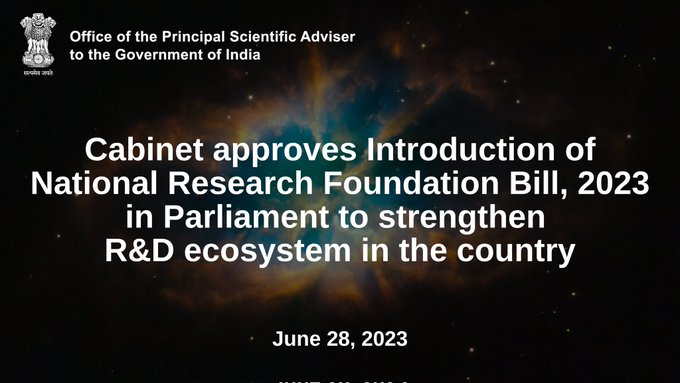The National Research Foundation (NRF) will be established as a top organisation to promote, fund, and mentor scientific research in higher education institutions across the nation, with a focus on developing the culture of research in universities and colleges. This is a promise made by the government four years ago, and it was approved by the government on Wednesday.
The submission of a bill in Parliament to permit the creation of the NRF, which is formed after the immensely successful National Science Foundation of the United States, was approved by the Union Cabinet. An initial budget of Rs 50,000 crore is planned for the NRF over a five-year period between 2023 and 2028.
In comparison to many other countries, India spends a meagre 0.7% of its GDP on research and development. In fact, the final year for which verified data is available, 2018, the gross expenditure on R&D decreased from 0.84 percent in 2008 to roughly 0.69 percent. In contrast, the United States spent 2.83%, China spent 2.14%, and Israel spent 4.93%. Even Brazil, Malaysia, and Egypt invest a greater percentage of their GDP to research.
On January 3, 2019, during his speech to the Indian Science Congress, Prime Minister Narendra Modi made the first public mention of the NRF plan. On January 20 of that year, at a joint session of Parliament, the NRF received a second reference. Later, in July 2019, during the Budget Session, the Finance Minister made a speech on it. One of the main suggestions of the National Education Policy 2020 was the establishment of NRF. The Covid pandemic’s interruption, according to Science and Technology Minister Dr. Jitendra Singh, prevented the NRF from being created sooner.
The Science and Engineering Research Board (SERB), the primary funding organisation for the Department of Science and Technology, will be absorbed into the NRF. The SERB was established in 2008 and is in charge of funding science and technology start-ups, establishing incubators, and funding science-related projects in central and state universities. Approximately 65% of SERB money, according to DST officials, were allocated to the IITs, with only 11% going to initiatives at state colleges. Facilitating research in universities is expected to be one of the key focus areas for NRF.
“For some reason, there has been an artificial separation between research and higher education in the country. There are research institutions, and there are colleges and universities where very little research is carried out. One of the objectives of the NRF would be to build research capacities in our universities. The union of education and research must be restored,” said Spenta Wadia, founding director of Bengaluru-based International Centre for Theoretical Sciences, a centre of the Tata Institute of Fundamental Research.
“India has, in the past few years, announced several major new missions in fundamental and translational research like the supercomputer mission or the quantum mission. These need an efficient and integrated management system for implementation that moves the fulcrum of research into university system. We have also opened dozens of new universities – IITs, IISERs, AIIMSs, state universities, private universities and colleges. These, and our older university system, need injection of research funding and capabilities. Our research everywhere needs to be internationally competitive and linked to society and industry. The NRF aims to do all of this, and more,” Former Principal Scientific Advisor K VijayRaghavan said.
The DST would serve as the administrative home of the NRF, which would have a 16-member governing board made up of two DST employees, five business representatives, one humanities representative, and six specialists who would be chosen based on the type of project being reviewed. Officials stated that the NRF would also offer fellowships for post-doctoral research, for which there is currently little financing.
“Since the scope of the NRF is wide-ranging, impacting all ministries, the Prime Minister will be the ex-officio president of the board and the Minister of Science and Technology and the Minister of Education will be the ex-officio vice presidents. The NRF’s functioning will be governed by an executive council chaired by the Principal Scientific Advisor to the government of India,” the DST told to the sources.
According to officials, the industry would provide 36,000 crore of the expected 50,000 crore in funding over the next five years. Projects involving scientific research would receive equal funding from the DST and industry under the NRF.










